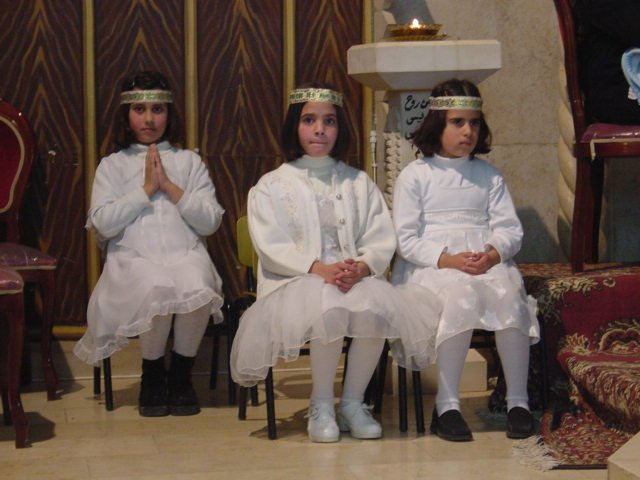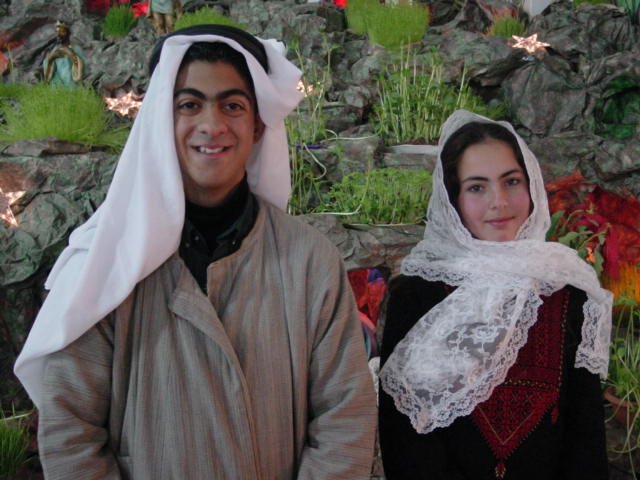The Play's the Thing
Angels at Zababdeh's Christmas Eve Service.
Christmas pageants are things of predictability. They remind us of Christmases past, because the script never changes. From the outset, we know the plotline, the characters, and the scenery, down to the last straw. Yet we still put on pageants every year. Of course, they are fun for the kids, and adults like doting on the cute angels and nostalgically singing carols. We take comfort in their predictability and familiarity.
As kids in Zababdeh prepare their Mary and Joseph costumes, they are also part of another pageant, similarly predictable but far from comforting. For more than a year, they - and we - have seen their land sucked deeper and deeper into a vicious cycle of violence. Like the treasured Christmas pageant, the script changes little, and the players seem to know their lines fairly well. A bus is blown up; a school is shelled. A driver is shot; a leader is assassinated. One action leads to another, and we have become so used to the story we could write the next act ourselves.
Journalist John LeCarri reported in 1982 that "terror is theater" - sanguine, perhaps, but true. Terrorism is perpetrated to send a message to an audience (opponents, supporters, the world at large) and elicit a response. Here, two sides are engaged in violent acts of terror as they pen bloody messages assuring enemies and allies alike of their strength - all, of course, is served up cinematically to influence the armchair audience. Meanwhile, we see Israeli and Palestinian talking heads sparring on TV, vying for world opinion. The nightly news has become like a bad TV drama, overfull with violence and lacking almost as much imagination as morality.
Meanwhile there's another drama backstage, the realities of the people who live on the set. From our seats in Zababdeh (luckily for us not front and center, but close enough to be spattered by sweat and blood from the stage), we have seen a lot of suffering. For weeks, the siege on Jenin district has prevented many of our students and teachers from coming to school. For weeks, we haven't been able to go to the bank (in a place where ATMs are unheard of). Many days we had no telephone service (or, consequently, internet access) as everything routes through Jenin. Our good friend, a man who has taken pains to welcome us, had a heart attack last week; it took the ambulance two and a half hours to make a (normally) fifteen minute trip to Jenin's hospital. (Thank God he made it and has improved. Our prayers are with him as his family tries to take him to Amman for surgery soon.) Our neighbor, who used to work in a Jerusalem hotel, now tries to earn money with a taxi; yesterday he brought home a gross of 15 shekels ($3.50) for his family of seven.
As you probably know, these examples are less dire than others. In Zababdeh we do not have deadly bombs in our shops or bullets flying in our streets. Unlike too many others who have died as they waited at checkpoints or trying to go around them, our friend made it to the hospital in time. None of our students has been killed or injured; our school has remained open and has not been damaged (last week the Quaker Friends' School in Ramallah was hit by missiles from an Israeli helicopter). People in Zababdeh may not have work, but few are going hungry, and none are having their homes shot at or demolished.
Mary and Joseph at Zababdeh's Christmas Eve Service.
As we watch such things happen, we sit, unable to look away, but unable to act. We know the script; we see the repeating cycle - what can we do but follow along? Jesus lived in a world like this. A script was written for the Messiah, and he was expected to follow it. He should come in glory and free the people from the oppressive Roman occupation - a political solution for a political problem. But Jesus didn't follow the script; rather, he turned it on its head, angering the crowds. He compared them to children playing in the street, calling out to others: "We played the flute for you, and you did not dance; we sang a dirge, and you did not mourn." In other words, Jesus failed to meet their expectations. He didn't play along. His death on the cross was the widest deviation of all - the Messiah was supposed the kill the Romans, not be killed by them! Our great Hebrew comedy turned to tragedy. Our king wore the crown of thorns, not the one of gold set aside for him. But in his death lies the beauty of possibility. The moment we think that the curtain has fallen, that the play has ended, Jesus, again defying our expectations, delivers the message of hope through his resurrection.
As we move through this Christmas season, may we be moved by this promise of hope. May its grace, passion, and courage fill every detail of the pageants we watch - as well as those we live out.


